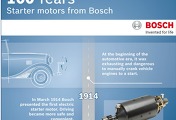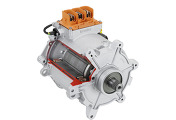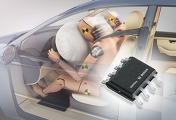CeBIT 2014 – Connected industryBosch board member Struth: “Realizing economies of scale in how we grow our knowledge base”
Hannover – “At Bosch, we’re not just making connected industry a reality, it already is – and its future is bright around the world.” These were the words of Bosch board of management member Dr. Werner Struth at the CeBIT Global Conference. The technology and services company is relying on its own expertise and on its broad-based footing to implement connected industry (“Industry 4.0”). “We have all the competencies we need to turn connected industry into reality, both for ourselves and for our customers and partners,” Struth continued. Bosch is not only a leading supplier but also a leading user of these technologies. The company already offers software and hardware solutions for connected industry, and has successfully introduced aspects of connected industry at its own plants, including standardized data exchange between companies.
Exploratory approach and broad-based footing
“Worldwide, we’re currently running some 50 pilot projects to put beneficial use cases for connected industry to the test,” said Struth, whose responsibilities as a member of the Bosch board of management include manufacturing systems. The company’s approach is both centralized and decentralized: it gives the various projects attached to different Bosch units a great deal of freedom in how the functional specifics of each use case are defined. Meanwhile, it sets up a central organizational unit to act as global coordinator for the various initiatives, in particular as regards a unified software and hardware architecture. “Working in this way allows us to realize economies of scale in how we grow our knowledge base,” Struth continued. “The exploratory approach we’re taking leads to new, inspiring, and innovative solutions.” He went on to say that from the user’s point of view it is important for technical standards to be defined that allow easy configuration of systems, and that it is also essential to give due weight to security considerations.
With more than 260 manufacturing sites worldwide, Bosch has extensive manufacturing know-how, stretching from the manufacturing of millions of automotive components to the customized manufacturing of packaging machinery. This know-how is complemented by the software expertise of the company’s own software and systems unit, Bosch Software Innovations.
The real revolution is in business models
Struth pointed out that the current phase is centered on two key tasks. One of them is to develop further enablers for connected industry, for instance data recording and transmission using RFID (radio-frequency identification) tags or web-enabled sensors, along with data mining. The other task is to develop beneficial use cases and new business models. “In what people are calling the fourth industrial revolution, the real revolution will be in new business models. And those who stand to gain from connected industry are those who can develop user-oriented solutions,” Struth stressed.
Additional information:
Background: Connected industry / Industry 4.0
Practical example: Virtual representation of supply chains
The internet of things – what is it?
The commercial potential of the internet of things
Sensors – the sensory organs of the internet of things
Background: Connected industry / Industry 4.0
Practical example: Virtual representation of supply chains
The internet of things – what is it?
The commercial potential of the internet of things
Sensors – the sensory organs of the internet of things
The Bosch Group is a leading global supplier of technology and services. According to preliminary figures, its roughly 281,000 associates generated sales of 46.4 billion euros in 2013 (Note: due to a change in the legal rules governing consolidation, the 2013 figures can only be compared to a limited extent with the 2012 figures). Its operations are divided into four business sectors: Automotive Technology, Industrial Technology, Consumer Goods, and Energy and Building Technology. The Bosch Group comprises Robert Bosch GmbH and its more than 360 subsidiaries and regional companies in some 50 countries. If its sales and service partners are included, then Bosch is represented in roughly 150 countries. This worldwide development, manufacturing, and sales network is the foundation for further growth. In 2013, Bosch applied for some 5,000 patents worldwide. The Bosch Group’s products and services are designed to fascinate, and to improve the quality of life by providing solutions which are both innovative and beneficial. In this way, the company offers technology worldwide that is “Invented for life.”
The company was set up in Stuttgart in 1886 by Robert Bosch (1861-1942) as “Workshop for Precision Mechanics and Electrical Engineering.” The special ownership structure of Robert Bosch GmbH guarantees the entrepreneurial freedom of the Bosch Group, making it possible for the company to plan over the long term and to undertake significant up-front investments in the safeguarding of its future. Ninety-two percent of the share capital of Robert Bosch GmbH is held by Robert Bosch Stiftung GmbH, a charitable foundation. The majority of voting rights are held by Robert Bosch Industrietreuhand KG, an industrial trust. The entrepreneurial ownership functions are carried out by the trust. The remaining shares are held by the Bosch family and by Robert Bosch GmbH.
Additional information is available online at www.bosch.com and www.bosch-press.com, http://twitter.com/BoschPresse.
PI8509 - March 12, 2014
/ Photo & Report provided by Bosch Press Release - sujung.jang@kr.bosch.com
/ MediaPaper.KR mediapaper@ymail.com Sejin Oh
/ The News Article was written by receiving a Press Release.
'Car > BOSCH' 카테고리의 다른 글
| 100 years of Bosch starter motors (0) | 2014.03.17 |
|---|---|
| The new American way of driving - downsizing, diesel, and electrical powertrains gain momentum (0) | 2014.03.14 |
| New Bosch acceleration sensors (0) | 2014.03.11 |
| Bosch is networking vehicles and revolutionizing mobility (0) | 2014.03.05 |
| Bosch supplies energy storage system for pioneering housing complex (0) | 2014.03.04 |







댓글